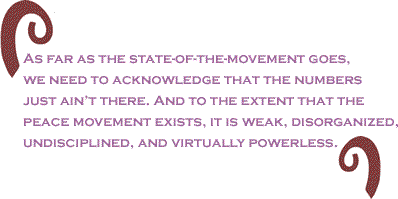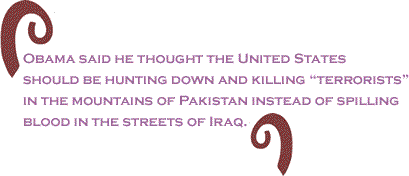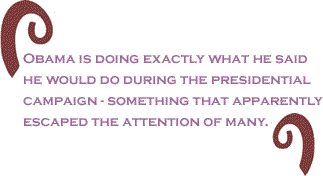
|
||||||||||||||||||||||
|
||||
 |
||||
| �If you want peace, understand war� - B.H. Liddell Hart The only thing truly surprising about the Obama administration announcing an escalation of the war in Afghanistan is the surprise and disappointment being expressed by the Clausewitz-total-war-types and the Obama-supporting-pragmatic-progressives. Obama is doing exactly what he said he would do during the presidential campaign - something that apparently escaped the attention of many. George Bronner, a Republican from Knoxville, Tennessee told The New York Times that the speech �change(d) my opinion about Obama, and it changes it for the better. I didn�t think he was going to step up to the plate and get more people over there.� Then, you�ve got Betty Holstine, a Democrat from Belle, West Virginia telling The Times that she became �anti-war� (read: anti-this-war) after realizing that lots people were being killed. Sigh. �I was so eager to trust somebody to make things better,� Betty is quoted as saying. �Perhaps I put too much faith and trust in the man. I just felt really disappointed and betrayed...� And there�s millions of allegedly awake Americans in the same boat as George and Betty. I know it�s been two years and this is ancient history but waaaay back in August 2007, candidate Obama went to the Woodrow Wilson International Center for Scholars in the nation�s capital to give what was billed as a �major foreign policy speech.� The speech garnered a lot of media attention at the time because Obama said he thought the United States should be hunting down and killing �terrorists� in the mountains of Pakistan instead of spilling blood in the streets of Iraq. �If we have actionable intelligence about high-value terrorist targets and President Musharraf won�t act, we will,� Obama said. While U.S. troops had fought �valiantly� in Iraq, the Senator from Illinois said, Afghanistan had fallen into the hands of the Taliban, in �a mix of terrorism, drugs and corruption (that) threatens to overwhelm the country.� �As president,� Obama proclaimed. �I would deploy at least two additional brigades to Afghanistan to re-enforce our counterterrorism operations and support NATO�s efforts against the Taliban.� And just in case some folks didn�t hear or read about the speech given a year-and-half before Obama set foot in the White House, he repeated the decidedly hawkish position up and down the campaign trail, saying the U.S. had �taken our eye off the ball� by invading Iraq instead of focusing on Afghanistan.
The response to Obama�s �surge� speech has been predictable too. It�s not enough for the hawks. It�s too much for the doves. And everyone else is swirling in the widening gyre of the constantly-shifting political center that William Butler Yeats wrote about - �the centre (that) cannot hold.� The place where �things fall apart.� As for me - an unsettled, militant spirit with a desire to live the words of the black gospel lyric encouraging believers to �become more like Jesus,� I cast my lot with the doves. But I fly into this debate - not to focus on what the hawks don�t seem to get (namely that, short of genocide, there is NO military solution to guerrilla insurgencies) - but with a question sure to ruffle a few feathers among my political kinfolk. Aren�t you tired of losing? I am. I�m also convinced that if we want to stop losing and start winning, we�re going to have to start being honest about the state of the movement while simultaneously crafting a �grand strategy� for winning. As far as the state-of-the-movement goes, we need to acknowledge that the numbers just ain�t there. And to the extent that the peace movement exists, it is weak, disorganized, undisciplined, and virtually powerless. If that seems too harsh, I�d like someone to point to one single tangible non-symbolic victory since� well, ever.
Even among the �anti-war� crowd, the Quaker faction is tiny. Take MoveOn.org, for instance - one of the largest and most visible anti-war groups in the nation, with 5 million members (which is still only a third the size of the �Praise the Lord and Pass the Ammunition� Southern Baptist Convention). After Obama�s surge speech, MoveOn polled its membership and found that 16 percent actually supported the war in Afghanistan and 27 percent weren�t sure if they supported the war. An eye-popping 40 percent of MoveOn members supports the president�s escalate-before-exiting plan! Again, the numbers just ain�t there. And to a significant degree, we are dealing with a numbers game. Now, about �grand strategy.� I hijacked that phrase from the British military strategist B.H. Liddell Hart; not only because war an apt metaphor for the conflict that the peace/anti-war movement is presently facing, but also because few movement participants have taken the Art of War seriously, which is to say, have yet to adopt an approach and attitude as disciplined and committed as those who plan and perpetuate war. While we let that soak in, let me quickly add that I�m not the first to make the observation. The prophetic pacifist and tireless activist Daniel Berrigan dropped this little nugget of wisdom: �war, of course, continues, because the waging of war, by its nature, is total - but the waging of peace, by our own cowardice, is partial.� Cesar Chavez challenged the sense of moral superiority that sometimes rears its head on the left when criticizing the ignorant and fearful for their martial spirit: �you know, if people are not pacifists, it�s not their fault. It�s because society puts them in that spot. You�ve got to change it. You don�t just change a man - you�ve got to change his environment as you do it�.Nonviolence is hard work�. It is the patience to win.�
Pondering the U.S. occupation of the Philippines a century ago, William James articulated the deep challenge faced by those who would turn swords in plowshares. �What we now need to discover in the social realm is the moral equivalent of war: something heroic that will speak to men as universally as war does, and yet will be as compatible with their spiritual selves as war has proven itself to be incompatible.� Important as it is to call out the hypocrisy of the right, parse the prose of the President, and analyze the meaning of the moment, we�d do well to think about long-term vision. �Grand strategy.� Since Obama announced he was sending 30,000 more troops to Afghanistan we�ve seen, heard and read lots of analysis, but not much vision. Lots of reactionary pleas for more marches. More letter-writing. More speaking out. But not much big-picture thinking. While we�re working in fits and starts to stop the war in Afghanistan, we need to organize a gathering of every major peace group in the country and talk about �grand strategy.� Talk about institution-building. Talk about how we can stop preaching to the choir. Talk about creating think-tanks who can conceive of �the moral equivalent of war.� Talk about studying Sun Tzu and Clausewitz. Talk about creating a shadow government with its own Department of Peace. Talk about raising a disciplined army of peace warriors. Talk about cultivating insiders committed to peace. And to talk about the difference between strategy and tactics. About the difference between long-term vision and short-term goals. I keep coming back to Hart�s concept of �grand strategy.� Hart defined strategy as �the art of distributing and applying military means to fulfill the ends of policy.� Taking that as a metaphor for the conflict the peace movement faces, let�s look beyond the mental images that military terms conjure up in the mind of anti-war agitators and understand �thine enemy� (Replace the word �military� with �militant,� as Mary Vorse suggests, if that makes you feel more comfortable).
Hart continues. �For strategy is concerned not merely with the movement of forces - as its role is often defined - but with the effect. When the application of the military instruments merges into actual fighting, the dispositions for and control of such direct action are termed �tactics.�� Peace marches and letter-writing campaigns are fine tactics, I suppose, but what are the effects? How can those tactics be employed more effectively? Scott Ritter in his slim volume �Waging Peace: The Art of War for the Antiwar Movement,� the former U.N. weapons inspector points to an instructive example - the �counter-recruitment movement, in which activists target the recruitment of high school juniors and seniors by military recruiters trying to fulfill a recruiting quota in order to keep the ranks of the America�s all-volunteer military full.� �The main point to be made here�is that counter-recruitment is not a strategy. It is not even an operational aspect of strategy. It is merely a tactic, a tool to be used as part of a larger goal and objective. Unfortunately, many in the counter-recruitment community continue to view their efforts in a strategic light, as if opposing military recruiters is an end unto itself. Unless one can place counter-recruitment into a context, however, it is doomed to fail as a tactic.�
The peace movement will continue to experience disappointment and defeat as Betty from West Virginia expressed, as long as we fail to develop a long-term vision - a �grand strategy� - that takes waging peace as seriously as hawks approach waging war. We can talk about formulating a grand strategy for our own escalation plans or we can sit around and act surprised that Obama is listening to the hawk on his shoulder. BlackCommentator.com Guest Commentator Nathaniel Turner is a pseudonym for a Gen X writer, newspaper editor and activist. He is a news analyst who offers commentaries on contemporary issues facing the progressive movements in the USA Click here to contact Mr. Turner. |
||||
 |
||||
If you would like to comment on this article, please do so below. There is a 400 character limit. You do not need a FaceBook account. Your comment will be posted here on BC instantly. Thanks. Entering your email address is not mandatory. You may also choose to enter only your first name and your location.
|
||||
Thank you very much for your readership. |
||||
| Any BlackCommentator.com article may be re-printed so long as it is re-printed in its entirety and full credit given to the author and www.BlackCommentator.com. If the re-print is on the Internet we additionally request a link back to the original piece on our Website. | ||||
| |
||||
| December
10 , 2009 Issue 354 |
| Executive Editor: Bill Fletcher, Jr. |
| Managing Editor: Nancy Littlefield |
| Publisher: Peter Gamble |
| Est. April 5, 2002 |
| Printer Friendly Version in resizeable plain text format |
 |
 |

|
 |
| |
| |















































